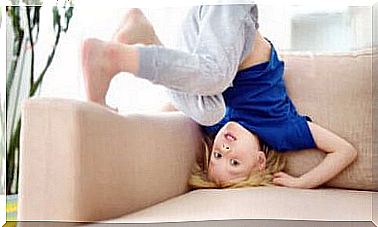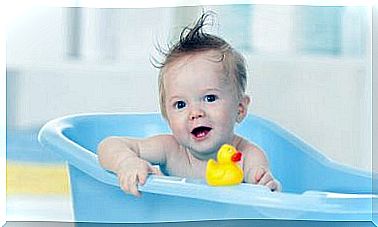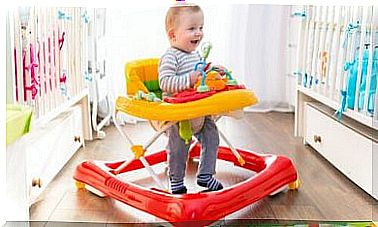Baby In Your Arms All The Time – What’s Too Much?

Being in the arms of a mother, father, or other familiar adult is the best pastime for a small baby. This article will help you understand why your baby wants to be in your arms all the time. In addition to this, we want to offer you useful advice in this regard.
Why does a baby want to be in her arms all the time?
The fact that a baby wants to be in her arms all the time is due to human nature. Man is a being who needs affection to grow – so physical contact is like a fertilizer for us. From birth, a person seeks the contact of another person in order to develop and be happy.
It’s also important to know that a small baby naturally favors his mother – after all, he spent about 40 weeks in his mother’s womb. And it is the mother who provides the baby with the milk she needs. Usually, the mother is also the one who sings to her child, puts him to sleep, changes diapers, and bathes the baby. So it’s no surprise that a baby wants to spend most of their time right on their mother’s lap.
The baby does not like being alone, because when he is alone, he feels vulnerable. When a baby has companionship or when he or she is in someone’s arms, he or she feels calm and safe.
Your baby needs this gentle and loving support for healthy emotional development. Adult affection also greatly affects a child’s self-esteem development.
Many think a baby is spoiled for fun if he or she is constantly looking into his or her arms. These same people believe the baby is manipulating the adults caring for him with his crying. However, this is far from the truth.
It is important to understand how significant the affection and skin contact shown in infancy has.
What’s too much?

We stated above that holding a baby in your arms is vital to a child’s healthy development. However, there are situations where holding a baby in your arms can be unhealthy for both the baby and the mother.
There are children who only want to be in their mother’s arms, 24 hours a day. Such a baby cries inconsolably if he is lowered from his arms or if he falls into the arms of someone other than his mother.
This type of attachment is harmful because the child is completely dependent on his or her mother’s lap. The baby can’t be on its own, and doesn’t even try to do things on its own. For a mother, this can be very exhausting, as the mother also needs rest and time for herself. A child who is completely dependent on the mother can cause maternal stress, depression, and countless tears.
What to do if the situation becomes insurmountable?
While showing affection and affection should not be neglected, affection parenting should not be taken to extremes either. Holding your baby in your arms 24 hours a day is no longer beneficial, on the contrary, even harmful.
A child who has grown up practically in his mother’s arms will find it difficult to grow independently in the future. The child learns to believe that it is the mother who does everything for her.
Keep an eye out for signs that your child is over-dependent. Such a sign is, for example, that the baby agrees to eat only when fed by the mother, even though he can already keep his own bottle.
Another sign may be that the child does not agree to lift the pacifier he dropped, but expects the mother to lift it. The baby may even expect a pacifier to be put in his mouth. If these signs are appropriate for your own child, it is time to break the mental umbilical cord.
We continue to remind you that the child must not be neglected on an emotional level, and the affection and affection a child needs must not be left unchecked. The baby should be held in his arms, hugged, rocked, kissed and cared for in all necessary ways.
If the baby is too attached to his mother, the attachment can become chronic. As a mother, you need to change the situation, and other family members support you in it. Here are some tips to give you a try.
Spend time with other people as well
The mother must stop being the center of the child’s life. It is important for a child to understand this so that he or she can spend time with other people as well, whether they are family members or friends.
Maybe the child’s grandfather can play with the child in the mornings or the baby’s godmother will go for a walk with the little one in the afternoon. Or maybe you can ask your baby’s older cousin for help feeding your child during meals.
If other people are involved in the child’s daily routines, the burden on the mother is reduced. At the same time, the child’s anxiety decreases, independence increases, and the child learns to create beautiful and important human relationships with loved ones.
Stimulate your child’s development
The baby is excited about learning something new. Placing the baby on the floor will also help strengthen his body. When you give your child new toys or items, he or she will start to explore them with interest. And as the baby learns to crawl, he gets to explore his environment even better.
All of the above tips will help your child strengthen their independence and forget the mother’s lap, which is so important to him.
Keep in mind, however, that the mother should not be the only one who encourages her child to engage in these activities, but all family members should be involved in activating the baby.









